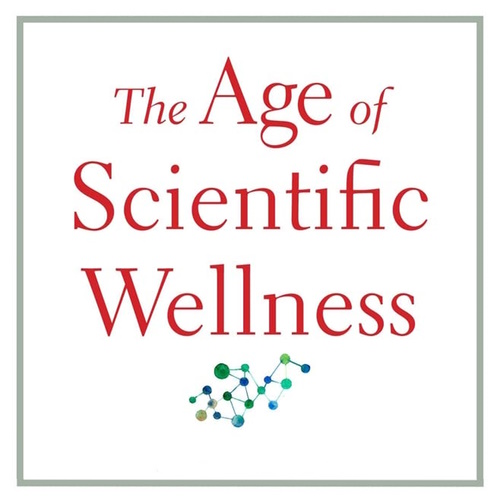The Age of Scientific Wellness
Why the Future of Medicine Is Personalized, Predictive, Data-Rich, and in Your Hands, written by Leroy Hood and Nathan Price
Taking us to the cutting edge of the new frontier of medicine, a visionary biotechnologist and a pathbreaking researcher show how we can optimize our health in ways that were previously unimaginable.
We are on the cusp of a major transformation in healthcare―yet few people know it. At top hospitals and a few innovative health-tech startups, scientists are working closely with patients to dramatically extend their “healthspan”―the number of healthy years before disease sets in. In The Age of Scientific Wellness, two visionary leaders of this revolution in health take us on a thrilling journey to this new frontier of medicine.
Today, most doctors wait for clinical symptoms to appear before they act, and the ten most commonly prescribed medications confer little or no benefit to most people taking them. Leroy Hood and Nathan Price argue that we must move beyond this reactive, hit-or-miss approach to usher in real precision health―a form of highly personalized care they call “scientific wellness.” Using information gleaned from our blood and genes and tapping into the data revolution made possible by AI, doctors can catch the onset of disease years before symptoms arise, revolutionizing prevention. Current applications have shown startling diabetes reversed, cancers eliminated, Alzheimer’s avoided, autoimmune conditions kept at bay.
Book Review
This well researched book is written by people with significant hands-on experience of applying big data to the healthcare industry, so provides plenty of real-world examples of what does, and doesn't, work. The authors believe that we are at the dawn of a healthcare revolution that will shake-up today's healthcare system which is reactive, treating diseases long after they've taken root.
Hood and Price see a future, not too far away, where we can predict and prevent most chronic diseases, shifting the focus from illness to wellness. It's a future where our healthcare is informed by our genome, lifestyle choices, and life history, and where data-rich, AI-powered systems drive diagnoses and treatments. However, this revolution won't be possible without a shift in our understanding of disease and wellness, and a commitment to making healthcare more transparent and accessible.
It reminded me of what an early stage we are in preventative medicine - the average "full" blood panel test today is nothing compared to the thousands to molecules and proteins that we might test for in future to give early warning of disease. Although they don't believe humans will eventually live forever, they are expecting an extra 10-20 years of healthspan and lifespan, and this could bring longevity escape velocity within grasp of millions more people.
Highlights
Here are 100 key points from The Age of Scientific Wellness.
- We are in the first stage of the largest paradigm shift in healthcare since the beginning of modern medicine.
- In today’s world, medical interventions happen long after a disease has taken hold.
- People who contract one disease are more likely to become sick with another.
- We are on the cusp of a time when we will have the capacity to begin to eliminate most chronic diseases.
- But we do not foresee a future in which we beat back all diseases, altogether and forever.
- The ten most popular drugs in the United States today work, collectively, for only about 10 percent of treated patients.
- Ultimately, a life span and a health span should be virtually the same.
- Human Genome Project saw similar objections to ageing research, including worrying that this enormous project would take resources away from smaller research efforts.
- There are very few processes in our bodies in which A causes B, and B causes C, and so on in a simple, linear manner.
- Disease is very simple at its inception and disease-perturbed biological networks become increasingly complex.
- You cannot hope to understand a state of disease if you don’t understand a state of wellness.
- P4 medicine is healthcare that is predictive, preventive, personalized, and participatory.
- The medicine we practice today may soon seem like something from the Dark Ages.
- Put simply, under the current healthcare system, wellness isn’t profitable.
- By 2076 ... the biological experience of being 80 is not substantially different from that of being 50.
- We propose eleven guiding principles for our vision of twenty-first-century medicine.
- 1. Healthcare Should Be Wellness Centered
- - Doctors who allow their patients to even get symptomatic should feel as if they have failed.
- 2. Healthcare Should Be Informed by Your Genome
- 3. Your Healthcare Should Be Informed by Your Lifestyle Choices and Life History
- - Each person has a unique life experience that leads to a present state of health.
- 4. Healthcare Should Become More Data-Rich
- - Most doctors base their diagnoses on a very small number of lab tests and clinical observations.
- 5. Healthcare Should Be Systems-Driven and Powered by Artificial Intelligence
- - The vast amount of data needed for this vision of healthcare will be beyond the comprehension of any human.
- 6. Healthcare Should Aim to Eliminate Chronic Disease
- - Chan Zuckerberg Initiative has a mission of curing, managing, or preventing all disease by the year 2100.
- 7. Healthcare Should Be Focused on Healthy Aging
- - For most of human history, once a debilitating disease struck, death would come quickly.
- 8. Healthcare Should Be Regenerative
- - It is entirely plausible that we will eventually be able to grow everything from hearts to lungs to eyes from our own stem cells.
- 9. Healthcare Should Be Focused on Optimizing Brain Function
- - The brain is enormously plastic and hence retrainable.
- 10. Healthcare Should Mostly Be Practiced in the Home
- - In- and outpatient treatment reserved for procedures that require highly specialized equipment.
- 11. Healthcare Costs Should Be Much More Transparent
- - Medical expenses contribute to two-thirds of all bankruptcies in the United States.
- Today there are more than one hundred centers, institutes, and departments across the world dedicated to systems biology.
- Pioneer 100 Wellness program began with 108 people.
- Our new company, Arivale, was based on personalized, data-driven health coaching.
- The human genome is composed of roughly three billion nucleotides - where approximately one in every thousand is a variant.
- Cancer-causing genetic mutations occur many years, sometimes even decades, before diagnosis.
- Although white individuals of European descent make up about 15 percent of the global population, they comprise about 80 percent of all participants in genome-wide association studies.
- There are about 7,000 Mendelian recessive diseases,
- There are more than one hundred diseases currently associated with polygenic scores.
- Most diseases — perhaps even all of them — have “pre-warning signs,” ... that can be identified by quantification in blood.
- Biological aging has correctly been described as the greatest risk factor for most chronic diseases.
- Expected values for many blood analytes differ substantially from the norms as a function of personal genetics.
- Distinct microbiomes are associated with the gut, skin, and oral cavity.
- There is still no clear consensus of what constitutes a “healthy” gut microbiome.
- Bioethicists feared that people who learned they had a genetic propensity for disease would be overwhelmed with anxiety but research doesn’t back it up.
- The hope for scientific wellness and healthy aging is that most of us will move into our nineties mentally alert and physically healthy.
- Aging is a condition that can and should be fought ... think of it as a “disease in slow motion.”
- Not everyone wants to live longer, but just about everyone wants to live healthy for longer.
- Diabetes had the largest consistent effect on raising biological age, with an average of over six years.
- Biological age increases with disease and decreases with healthy behaviors.
- Anyone who intends to live a long and healthy life should be determinedly focused on their cognitive health.
- People who take on a new regimen of exercising or dancing have been shown to enjoy increased plasticity.
- Omega-3s are incredibly important for brain development and continued brain function throughout life.
- A number of important studies are under way that are generating dense molecular, physiological, and clinical data at a scale that dwarfs what was previously possible.
- Feedback mechanisms to maintain homeostatic consistency exist everywhere in the body.
- Individuals with one bad copy of APOE4 gene may have a threefold increase in their lifetime risk of developing Alzheimer’s.
- Cancers are highly heterogeneous, varying from person to person, tissue to tissue, and even cell to cell within a single tumor.
- The longer an initial cancer is allowed to exist, the greater the chance it will become a combination of mutation-driven, disease-perturbed networks, and the harder it will be to cure.
- Immunotherapy, now called immune checkpoint therapy, in which drugs are used to block proteins that keep one’s immune responses from effectively identifying and attacking cancer cells.
- Adoptive cell therapy, in which a patient’s own immune cells are used as treatment for cancer.
- Between 2017 and 2021, the number of immuno-oncology drugs in development grew by a staggering 233 percent to over 4,700.
- Grail recently analyzed the epigenetic profiles of white blood cells and was able to diagnosis about fifty different cancers.
- We hope to provide statistically validated early-stage biomarkers for most chronic disease transitions,
- AI will soon be as much a part of our healthcare experience as doctors, nurses, waiting rooms, and pharmacies.
- Powerful AI assessments augmented and amplified by highly trained human intelligence, a schema that has come to be known as “centaur AI.”
- In 2020, AlphaFold 2.0 jumped to nearly 85 percent Global Distance Test (GDT) in the Critical Assessment of Protein Structure Prediction competition.
- A 2017 study found that an average of 80 megabytes of information were generated by each patient per year.
- Another major domain of medical AI is interpreting imaging data.
- AI was able to detect arrhythmias on an electrocardiogram with higher accuracy than the average cardiologist.
- Expert systems are akin to having not one expert but thousands upon thousands, all working together at top speed.
- Clinical decision support systems have arisen to present physicians and other care providers with access to a wealth of information at the point of care.
- Medical mistakes account for about a quarter of a million deaths annually in the United States alone.
- DXplain resulted in significantly higher accuracy rates (84 percent versus 74 percent) on a validated diagnosis test involving thirty clinical cases.
- Urinary bladder tumor analysis could be performed with AI at an accuracy rate of 93 percent.
- With knowledge models new knowledge can spread instantaneously — a far cry from the painfully slow process of the individual-to-individual education and dissemination practices of today.
- A digital twin can be restarted, rebooted, and improved over time. It is a personal crash test dummy.
- The Human Phenome Initiative, conceived by Phenome Health, proposes to sequence the genomes and determine the longitudinal phenomes of one million individuals over ten years.
- We can identify a disease we want to understand, investigate its trajectory in a few hundred patients with the tools of whole genome sequencing and deep phenotyping.
- As of 2022, there were at least seventy-six genetic variants classified as clinically actionable.
- Pharmacogenomic information can be absolutely vital, as response to drugs like these in individuals with incompatible genetics can be lethal.
- One limitation of single-genetic variants for common diseases is that their effect size is often small - these variants wouldn’t be common if they were highly detrimental to survival.
- 10 percent of us will suffer from one or more of the 7,000 known “rare” diseases at some point in our lifetime.
- Your genetic code is unique to you. In that sense, it can never be completely anonymized.
- Whole-genome sequencing for infants in neonatal intensive care units revealed that half of these babies had a genetic defect that explained why they weren’t improving.
- A project that aims to sequence the genome of one million Singaporeans was launched in 2020;
- National Institutes of Health’s All of Us program aims to generate genomic data for one million people and linking this with medical and health information.
- There are striking differences in disease susceptibility and risk among many of demographic groups.
- Deloitte are now forecasting that healthcare expenditure is shifting such that the active pursuit of wellness will be a bigger source of revenue than disease care by 2040.
- There is no shortage of grifters, quacks, and snake-oil salesmen who are marketing themselves as wellness specialists but aren’t interested in or able to understand actual data-driven science.
- The easiest and least expensive way to get started is by tracking your own measures of digital health and using these to help improve habits related to wellness pillars such as exercise, diet, sleep, and stress management.
- Our bodies are subject to significant variability, and it is only by keeping careful watch over time that we can better understand what is happening to our individual systems.
- Outliers will be of exceptional value, providing mechanistic insight into wellness and disease.
- With genome and phenome analysis, and deep immune phenotyping, scientists can draw powerful conclusions from a small number of patients.
- “Value-based healthcare” would pay doctors on how many patients’ lives they meaningfully improve.
Visit website: https://www.hup.harvard.edu/catalog.php?isbn=9780674245945
Leroy Hood
Biologist, Author, Chief Strategy Officer and Co-founder of Institute for Systems Biology and CEO and Founder of Phenome Health
Details last updated 11-May-2023







